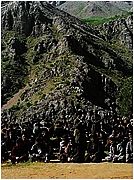This Time, Salafi Kurds Are Suspects
» Leads on Recent Events in Kurdistan
In his latest remarks, the Islamic Republic of Iran’s intelligence minister, who accompanied Mahmoud Ahmadinejad in his trip to Lebanon, accused “Kurdish Salafi groups” of involvement in recent deadly attacks in the cities of Mahabad and Sanandaj in Iran’s Kurdistan province. Some Kurdish media outlets also reported that more than one hundred members of the fundamentalist “Ansar al-Islam” group are preparing to carry out suicide attacks inside Kurdistan. Meanwhile, a senior member at a Kurdish political party revealed the discovery of a spying network inside his political party and claimed that the network was involved in last month’s attacks in Kurdistan.
The Islamic Republic’s intelligence minister ruled out the involvement of Jundallah group in recent attacks in Sanandaj and Mahabad, and instead claimed that Kurdish Salafi groups were behind the attacks.
Speaking to the official news agency of the Islamic Republic, IRNA, the Iranian intelligence minister Heidar Moslehi said, “Based on our latest efforts, our intelligence officers have found leads and are engaged in constructive cooperation with the police and the [Islamic Passdaran] Revolution Guards Corps, the results of which will be released at the appropriate time.”
Prior to the intelligence minister’s remarks, several Kurdish activists had expressed in interviews with Rooz that fundamentalist Kurdish groups were involved in the recent attacks. The suspicion was bolstered by eyewitness reports that people behind the attacks in Sanandaj left the scene of the explosion shouting “Allah Akbar.”
Salafis are a group of Sunni Muslims who advocate a return to the text of the Koran and the Sunna, or traditions as practiced by the “Salaf-e Saleh,” the pious predecessors. The Salafis oppose the various interpretations of Islam espoused by different groups and argue that Muslims can easily comply with their religious duties by directly consulting the Koran and the Sunna. The main objective of the Salafi followers is to establish an Islamic government.
Salafi groups had previously claimed responsibility for terrorist attacks in Kurdistan, but no Salafi group has yet claimed responsibility for the recent attacks in Kurdistan.
The Islamic Republic officials have also accused “anti-revolutionary” groups, “Zionists,” “Americans,” and “officers in the Iraqi Baath Party” of involvement in the attacks.
Within the past month, three separate clashes took place between unidentified armed individuals and the Islamic republic’s security forces.
Yesterday, a senior member of a Kurdish political party implicitly claimed responsibility for armed clashes in the city of Saghez, but blamed the incident on individuals he alleged to have been “planted” by the Islamic republic in the party.
Speaking to the Kurdish website KurdishPerspective, Jalil Azadikhah, the spokesperson for the Komaleh Zahmatkeshan party, led by Omar Ilkhanizadeh, claimed that three rogue factions have been discovered inside the party and announced that the party had arrested agents planted by the Islamic republic inside the party.


